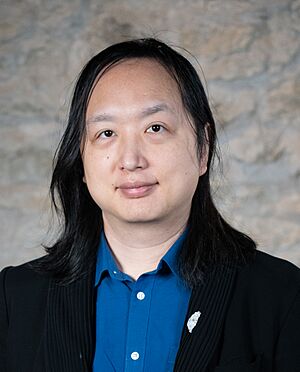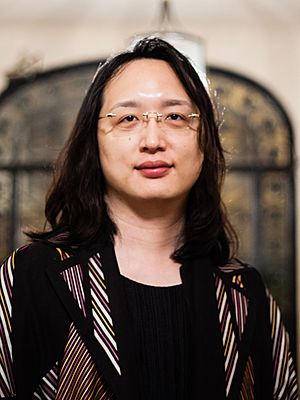Audrey Tang facts for kids
Quick facts for kids
Audrey Tang
Tang Feng |
|
|---|---|
|
唐鳳
|
|

Tang at SXSW 2025
|
|
| Taiwanese Ambassador-at-large | |
| Assumed office 7 October 2024 |
|
| President | Lai Ching-te |
| 1st Minister of Digital Affairs | |
| In office 27 August 2022 – 20 May 2024 |
|
| Prime Minister | Su Tseng-chang Chen Chien-jen |
| Deputy |
See list
Huai-Jen Lee
Chuei He-ming |
| Preceded by | Position established |
| Succeeded by | Huang Yen-nun |
| Minister without Portfolio | |
| In office 1 October 2016 – 27 August 2022 |
|
| Prime Minister | Lin Chuan Lai Ching-te Su Tseng-chang |
| Personal details | |
| Born |
Tang Tsung-han (唐宗漢)
18 April 1981 (age 44) Taipei, Taiwan |
| Political party | Independent |
| Parents |
|
| Relatives |
|
| Profession | Software programmer |
| Signature |  |
| Audrey Tang | |||||||||||||
|---|---|---|---|---|---|---|---|---|---|---|---|---|---|
| Traditional Chinese | 唐鳳 | ||||||||||||
| Simplified Chinese | 唐凤 | ||||||||||||
|
|||||||||||||
| Original name | |||||||||||||
| Traditional Chinese | 唐宗漢 | ||||||||||||
| Simplified Chinese | 唐宗汉 | ||||||||||||
|
|||||||||||||
Audrey Tang (born April 18, 1981), also known as Tang Feng, is a Taiwanese politician and computer programmer. She is famous for her work with free software, which is software that anyone can use, change, and share freely. From August 2022 to May 2024, she was the first Minister of Digital Affairs in Taiwan. She has been called one of the "ten greatest Taiwanese computing personalities."
In 2016, Tang became a Minister without Portfolio in Taiwan's government. This made her the first official in a top government role who openly identifies as not fitting into traditional gender categories. Tang has said she is "post-gender" and is fine with any pronouns people use for her online. She is also a leader in the Haskell and Perl programming language communities and a key member of the g0v group.
Early Life and Learning
Audrey Tang was born in Taipei, Taiwan. Her parents are Tang Kuang-hua and Lee Ya-ching. When she was four, she had a serious heart condition, but she recovered. Her mother helped create Taiwan's first consumer co-operative and an experimental school.
Audrey was a very smart child. She read classic books before age five and learned advanced math before age six. She started programming computers before she was eight years old. At first, she coded using just a pencil and paper because she didn't have a computer. She began learning the Perl programming language when she was 12.
Audrey spent some of her childhood in Germany. When she was 14, she left junior high school because she found it hard to fit in with school life. She felt that she was already learning a lot by working with researchers from places like Harvard and Stanford, so she didn't see the need to go to university. By the time she was 19, in the year 2000, she had already worked for software companies and as an entrepreneur in Silicon Valley in California.
In 2005, Audrey began to change her name and appearance to match how she felt inside. She said that for many years, she lived mostly online because her brain knew she was a woman, but society expected something different. In 2019, she said she identifies as "post-gender" or non-binary, meaning she doesn't identify as strictly male or female. She believes what matters is the experience, not just the pronouns used.
News reports have said that Audrey Tang has a very high IQ of 180. She strongly believes in autodidacticism, which means teaching yourself, and in creating open, free spaces for everyone.
Contributions to Free Software
Audrey Tang has made many important contributions to free software. She started and led the Pugs project, which brought together people from the Haskell and Perl programming communities. This project helped create the Perl 6 language.
She also helped make many free software programs work in different languages around the world. These include SVK (software), Request Tracker, and Slash (weblog system). She created Ethercalc, which is a tool for working with spreadsheets online. She also led efforts to translate many open source books into Traditional Chinese.
Between 2001 and 2006, Audrey started over 100 Perl projects on CPAN, which is a large collection of Perl software. One of her popular projects is the Perl Archive Toolkit (PAR), which helps package and share Perl programs. She also set up systems for testing and digitally signing software on CPAN.
Career in Government
Audrey Tang became involved in politics during Taiwan's 2014 Sunflower Student Movement. This was a time when students protested inside Taiwan's parliament building. Audrey volunteered to help the protesters share their message with the public.
After this, the prime minister invited Audrey to help create lessons about media literacy for schools in Taiwan. These lessons, which teach students how to understand and evaluate information from different media, were put into schools in 2017.
In August 2016, Audrey was appointed as a Minister without Portfolio for digital affairs in the government. She officially started this role on October 1, 2016. Her job was to help government groups explain their goals and manage the information they shared online. At 35, she was the youngest Minister without Portfolio in Taiwan's history. She was given this role to help connect older and younger generations.
Audrey believes in keeping public spaces, like the internet, free and open. She wants technology to benefit everyone, not just a few people. Her department does not use old-fashioned rules or strict hierarchies. In 2017, her team of 15 people chose to work with her. They work together to create plans each week, rather than following orders.
Audrey said her goal was to be a "channel" to bring together different ideas and strengths. During the COVID-19 pandemic in Taiwan, she used digital tools to gather ideas from people. She followed three rules: "fast, fair, fun." She also created a "humour over rumour" plan to fight misinformation. This plan responded to false information quickly, in short messages with fun images. Her ideas helped Taiwan respond well to the pandemic without needing a full lockdown.
Audrey joined the G0v movement soon after it started. This group uses technology to make government more open. She also helped with vTaiwan, an initiative that uses social media to let citizens create digital petitions. If a petition gets 5,000 signatures, it is brought to the government to be addressed. This system has led to changes, like making tax software available for non-Windows computers and changing rules for cancer treatment.
To be very open, Audrey records and transcribes all her government meetings. These are then uploaded to a public website. She also answers questions sent to her through another website.
In 2022, Audrey hosted a video podcast called "Innovative Minds with Audrey Tang" with TaiwanPlus. She talked with famous people like Steve Chen (co-founder of YouTube) and Vitalik Buterin (creator of Ethereum).
In January 2023, Audrey became an e-resident of Lithuania. This was announced during her first trip abroad as Digital Affairs minister. She also became the chairperson of Taiwan’s National Institute of Cyber Security board.
In May 2024, when Lai Ching-te became the new president of Taiwan, Audrey was replaced as Minister for Digital Affairs by Huang Yen-nun. In October 2024, Audrey was named one of ten new ambassadors-at-large for Taiwan.
Audrey believes that special computer programs called "bridging-based algorithms" can help social media bring people together and find common ground, instead of causing arguments.
See also
 In Spanish: Audrey Tang para niños
In Spanish: Audrey Tang para niños
- Anarchism in Taiwan
- Civic technology
- E-democracy
- Open government
 | Jessica Watkins |
 | Robert Henry Lawrence Jr. |
 | Mae Jemison |
 | Sian Proctor |
 | Guion Bluford |


